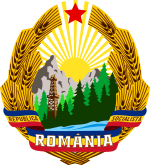This article relies largely or entirely on a single source. (August 2016) |

| Part of a series on the |
| Socialist Republic of Romania |
|---|
 |
The Romanian Orthodox Church operated within Communist Romania between 1947 and 1989, the era during which Romania was a socialist state. The regime's relationship with the Orthodox Church was ambiguous during this period: while the government declared itself "atheist", it actively collaborated with the Church, and, during the Nicolae Ceaușescu era, the government used the Orthodox Church as part of his promotion of national identity (see National Communism in Romania).[1]
Marxism–Leninism argued that religion was an instrument of exploitation and as such, it was to be desired to be discouraged, hence the anti-religious campaigns in the USSR.[1] In Romania, under Patriarch Justinian, the Orthodox Church adjusted itself to support the new Communist government's "social justice" goals.[2] The Orthodox Church did not protest or even acknowledge the existence of hundreds of thousands of Romanians in prisons and labour camps, some of whom were sentenced for religious reasons.[2]
In exchange for the support of the regime, the Romanian government disbanded the Romanian Church United with Rome, Greek-Catholic and forcefully integrated its believers, churches and cathedrals into the Orthodox Church.[3] Despite the compliance with the government, the Church also underwent a purge when the Soviet troops retreated from Romania. The government began a crackdown of possible dissidence among the religious people: between 1958 and 1963, about 2500 priests, monks and nuns were arrested,[4] with a tacit approval by the Orthodox Church hierarchy.
During the Ceaușescu era, the priests of the Orthodox Church not only complied with the requests of the government, but they also showed sycophancy.[1] Many priests collaborated with the secret police, the Securitate, giving it information they received from confessions;[5] according to the reports of a Securitate officer, as many as 80% of the priests were informers.[6]